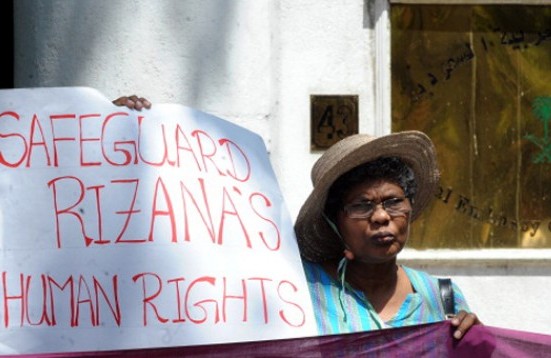Image Source:http://www.lankastandard.com/wp-content/uploads/2013/01/Rizana-Nafeek–e1357749570681.jpg
Earlier this month, seven men were beheaded in Saudi Arabia as punishment for stealing. They were accused of conspiracy, armed robbery, and raiding and breaking into jewelry stores back in 2005. The deaths were carried out despite the United Nations’ call for Saudi Arabia not to execute the men, because it was alleged that the men were not given fair trials.
Additionally, there were concerns that the men were tortured during their detention, and that they were forced to sign confessions. If these concerns regarding the torture of the men are indeed true, Saudi Arabia will have breached its obligation under international law, which has an outright prohibition on torture, as well as its international obligation under the Convention against Torture, which “explicitly forbids the use of all forms of torture for the purpose of extracting confessions or acquiring information.”
The SPA, which is official Saudi news agency, issued a statement on behalf of the Ministry of Interior of Saudi Arabia that begins with a Quranic verse:
The punishment of those who wage war against God and His Messenger, and strive with might and main for mischief through the land is: execution, or crucifixion, or the cutting off of hands and feet from opposite sides, or exile from the land: that is their disgrace in this world, and a heavy punishment is theirs in the Hereafter.
Is beheading as a method of execution warranted in this instance? Do you think it is ever warranted? Do you think that this type of retributive justice going to make an impact on others, or are other justifications of punishment more fitting in this instance and other instances?
What should happen to Saudi Arabia in terms of its breaking international obligations not to use torture, as well as carrying out the executions over the UN’s objections?
Source:

To answer Alison’s first question, I do not believe that the method of execution is warranted in this particular scenario, nor do I think that it can ever be warranted for the types of crimes committed here. A punishment for a crime should in theory be proportionate to the wrong committed. Based on crimes of the seven men consisting of conspiracy, armed robbery, and breaking into and raiding of jewelry stores, it is rather obvious that the judicial action of execution is disproportionate in relation to the severity of the crimes committed. On top of the penalty, the allegations of torture in obtaining the signed confessions further illustrate the problem with this result. However, I do believe the retributive justice taken here will have an impact on others going forward. This obviously provides a strong deterrent to anyone considering committing such crimes in the future, despite the fact that a more rehabilitative form of punishment would be preferable in this situation due to the nature of the crimes.
Excellent source of information.